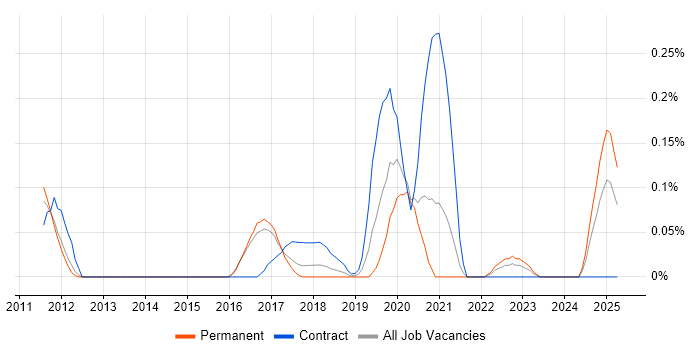Haskell
West Yorkshire > Leeds
The table below provides summary statistics for permanent job vacancies advertised in Leeds requiring Haskell skills. It includes a benchmarking guide to the annual salaries offered in vacancies that cited Haskell over the 6 months leading up to 6 May 2025, comparing them to the same period in the previous two years.
| 6 months to 6 May 2025 |
Same period 2024 | Same period 2023 | |
|---|---|---|---|
| Rank | 78 | - | - |
| Rank change year-on-year | - | - | - |
| Permanent jobs citing Haskell | 2 | 0 | 0 |
| As % of all permanent jobs advertised in Leeds | 0.26% | - | - |
| As % of the Programming Languages category | 0.68% | - | - |
| Number of salaries quoted | 2 | 0 | 0 |
| 10th Percentile | £57,875 | - | - |
| 25th Percentile | £58,438 | - | - |
| Median annual salary (50th Percentile) | £61,250 | - | - |
| 75th Percentile | £63,438 | - | - |
| 90th Percentile | £63,625 | - | - |
| West Yorkshire median annual salary | £61,250 | - | - |
All Programming Languages
Leeds
Haskell falls under the Programming Languages category. For comparison with the information above, the following table provides summary statistics for all permanent job vacancies requiring coding skills in Leeds.
| Permanent vacancies with a requirement for coding skills | 293 | 660 | 1,373 |
| As % of all permanent jobs advertised in Leeds | 37.71% | 29.32% | 45.39% |
| Number of salaries quoted | 240 | 514 | 849 |
| 10th Percentile | £28,738 | £32,500 | £37,500 |
| 25th Percentile | £42,500 | £41,250 | £44,500 |
| Median annual salary (50th Percentile) | £57,500 | £50,000 | £57,500 |
| Median % change year-on-year | +15.00% | -13.04% | +4.55% |
| 75th Percentile | £77,500 | £69,750 | £75,000 |
| 90th Percentile | £93,778 | £84,239 | £90,000 |
| West Yorkshire median annual salary | £57,500 | £51,528 | £57,500 |
| % change year-on-year | +11.59% | -10.39% | +4.55% |
Haskell
Job Vacancy Trend in Leeds
Job postings citing Haskell as a proportion of all IT jobs advertised in Leeds.

Haskell
Salary Trend in Leeds
3-month moving average salary quoted in jobs citing Haskell in Leeds.
Haskell
Co-occurring Skills and Capabilities in Leeds by Category
The follow tables expand on the table above by listing co-occurrences grouped by category. The same employment type, locality and period is covered with up to 20 co-occurrences shown in each of the following categories:
